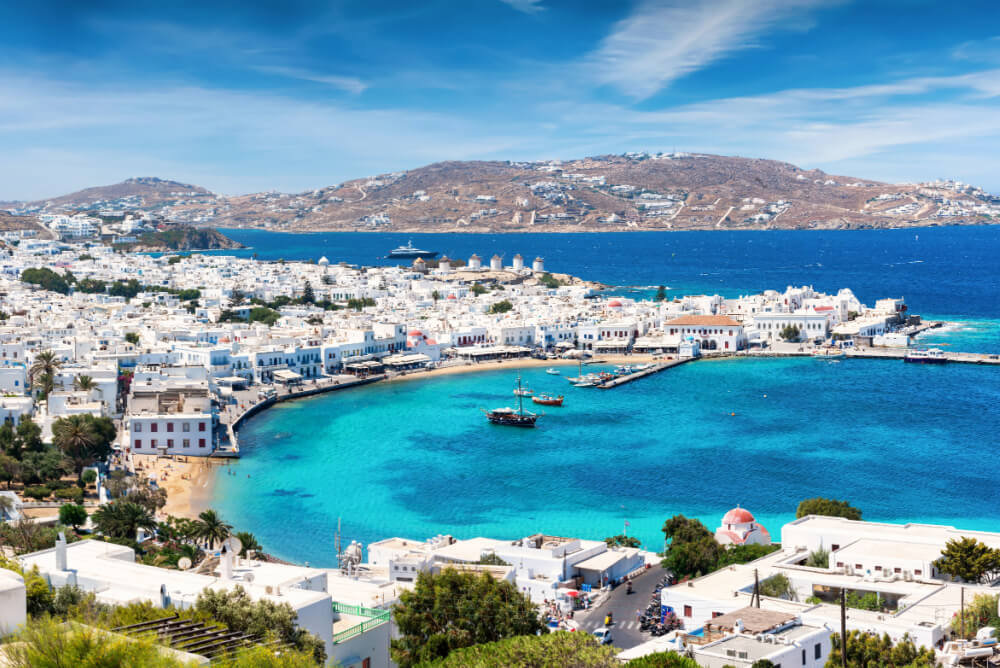Whether you want to visit Greece to experience the food and culture of Mykonos, embark on a historical fact-finding mission on Crete or relax on one of the beaches on Santorini, you’ll want peace of mind and a stress-free holiday. So, when organising your Greek getaway, travel insurance should be high on the list of things you need for your trip.
It’s a good idea to take out travel insurance, regardless of which travel destination you’re visiting. You can never predict when an injury, illness or other incidents will disrupt your everyday life, let alone your holidays when you’re supposed to be relaxing.
If you’re wondering whether travel insurance is worth it, consider the following:
Travel insurance can cover you for these things that can go wrong while on an overseas holiday, as well as many others. Not only that, but many providers also have 24/7 global emergency assistance helplines, so you’d never be without support.

It’s up to you to decide what kind of cover you need for your upcoming trip. However, here are a few things you might want to consider for your travel insurance for Greece, although the specifics of your policy will depend on your individual circumstances and your level of cover.
There are different levels of travel insurance to choose from. It will depend on your provider, but you can generally expect to choose between basic, standard and comprehensive levels of cover. When purchasing a travel insurance plan, thoroughly check the Product Disclosure Statement (PDS), which outlines the policy’s limits, terms, conditions, inclusions and exclusions.
Australia and Greece don’t have a Reciprocal Health Care Agreement, so if you need medical assistance while in Greece, you’ll have to foot the bill yourself – unless you have insurance. Medical evacuation or repatriation back to Australia can be extremely expensive, especially if you’re in a rural area or on an island. It’s a good idea to consider a travel insurance policy to cover overseas emergency medical expenses.
Petty crime, theft and pick-pocketing are unfortunately common in tourist areas, particularly in central Athens and on the islands.1 Having a travel insurance policy with cover for stolen belongings means you may be financially protected if these things happen.
Your policy can cover your personal possessions, such as valuables, credit cards, luggage, cash and travel documents (e.g. passports).
Depending on your level of travel insurance cover, you can be protected against the costs associated with delayed flights or cancellations, with a policy that reimburses you for accommodation bookings if your connecting flight is cancelled.
Your travel insurance cover may help protect you against legal expenses if your actions leave you at fault for injury to a person or their belongings or if you cause their death. However, if you were acting recklessly or illegally, your claim will be rejected, and you may need to take certain steps before your claim would be covered.
If you’re taking a cruise around the islands, it’s a good idea to consider adding cruise cover to your policy. If you take a cruise without this add-on, you likely won’t be covered for cruise-related losses by your regular travel insurance.
If you plan to participate in activities such as sailing, snorkelling or other water-based sports, check what activities will be covered by your insurance and consider adding adventure activity cover. You can check exactly which activities you may be covered for in your policy’s PDS.
Greece is a relatively safe country to visit, but it’s always good to remain cautious when travelling abroad. There is still a risk of petty theft, especially on public transport to and from the airport and in popular tourist areas. If you’re cruising around the Mediterranean to different Greek islands, don’t accept drinks from strangers or leave yours unattended, as drinking spiking has been known to occur.
You should regularly check the Smartraveller website before departure and while overseas to stay aware of travel advice. You can also check for any recommended vaccinations you should get prior to departure. If you get into trouble, the emergency services phone number in Greece is 112, and the Tourist Police (for non-serious incidents) can be contacted on 1571.1
You also need to know what your travel insurance doesn’t cover. Some common exclusions include:
Check the PDS before purchasing a policy to be sure of what you are and aren’t covered for.

You’ll need to have both your Australian driving licence and an International Driving Permit to be able to drive in Greece1 – but that’s not the only thing you need to be aware of.
Greek roads can be hazardous due to poor conditions and the drivers themselves.1 Pedestrians often aren’t given right of way, and vehicles may sometimes ignore traffic signals. Some intersections will have traffic police directing the flow of cars and pedestrians, and their instructions may contradict the lights. When this happens, always follow the directions of the officer.
It’s a good idea to be aware of any rules, laws or local customs in Greece that differ from Australia, including that:1
Since Greece is a Schengen country, Australians can enjoy visa-free travel to Greece for 90 days; however, if you leave the Schengen Area and return within 180 days, you won’t get another 90 visa-free days.1
You may need a visa if you’re travelling for purposes other than tourism or business, and you will still need a valid passport to enter Greece. Greece’s entry requirements can change, so be sure to check with the Embassy of Greece in Australia before you go.

If you’re heading off to the spectacular ocean views and stunning ancient architecture of Greece and haven’t sorted your travel insurance, tick it off your list now by using Compare the Market’s travel insurance comparison service.
Our service lets you compare a range of policies side-by-side in just minutes and at no cost to you. If you see a policy you like, you can purchase it through us. Simples!
If you’re travelling to multiple countries – say you’re touring around Europe – you might want to check out our full list of destination pages.
1 Smartraveller. Greece. Last updated December 2022. Accessed December 2022.